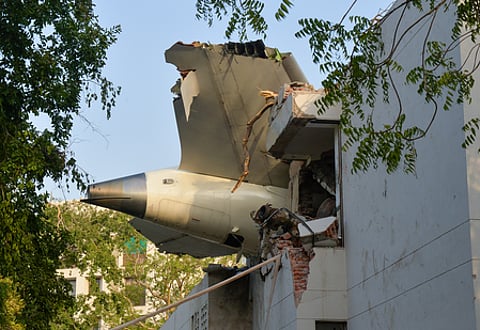Boeing fuel switches declared safe after Air India crash: US Federal Aviation Administration
No design flaws found in Dreamliner fuel system, says US FAA; crash probe continues

Dubai: The US Federal Aviation Administration (FAA) has formally declared that fuel control switches used in Boeing aircraft, including the 787 Dreamliner, do not pose a safety risk, despite their involvement in last month’s fatal Air India Flight 171 crash.
In a notice sent to foreign civil aviation authorities on July 11, the FAA stated that the design of the fuel switches — including their locking features — is not considered an "unsafe condition", and therefore does not warrant an airworthiness directive for Boeing jets, including the 787 model.
This announcement comes after India’s Aircraft Accident Investigation Bureau (AAIB) released a preliminary report last week revealing that fuel to both engines was cut off 32 seconds after take-off from Ahmedabad on June 12, when the switches controlling the fuel supply were found to have been moved from “RUN” to “CUT-OFF.”
The crash killed 260 people, including passengers, crew, and residents on the ground, making it the deadliest air crash in over a decade. The flight was en route to London Gatwick.
What did the US FAA say?
The FAA clarified that although a 2018 bulletin had urged carriers to inspect locking mechanisms on fuel switches due to reports of them being installed with the locking feature disengaged, this recommendation was advisory and not mandatory.
“Although the fuel control switch design, including the locking feature, is similar on various Boeing airplane models, the FAA does not consider this issue to be an unsafe condition,” the agency said.“The FAA will continue to share relevant information with foreign civil aviation authorities as appropriate.”
Air India skipped advisory checks
The AAIB noted that Air India had not conducted the suggested 2018 inspections on the fuel switch locking mechanisms, citing their non-mandatory nature.
However, maintenance records show no defects reported with the fuel control switches on the aircraft since 2023, and the throttle control module had been replaced in both 2019 and 2023 for unrelated reasons.
No fault found with aircraft or engines
The AAIB confirmed that, so far, no mechanical issues have been discovered with the aircraft or its GE Aerospace GEnx-1B engines. Accordingly, no safety recommendations have been issued for Dreamliner operators or GE engine users.
The crash is under joint investigation by the AAIB (India), the US National Transportation Safety Board, the UK Air Accidents Investigation Branch, and supported by the FAA under ICAO protocols.
While the investigation continues, the FAA’s clearance of the fuel switch design is a significant development that appears to shift the focus away from Boeing and toward operational procedures and pilot actions as potential contributing factors.
Sign up for the Daily Briefing
Get the latest news and updates straight to your inbox




